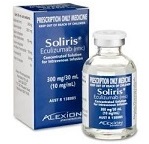 |
| Alexion's Soliris |
More orphan drugs are hitting the market than ever before. But as their numbers increase, their prices do, too. That makes them harder for patients to access--and pharma companies may have to do something about it, if they don't want to back themselves into a corner.
Regulatory incentives, exclusive market access and pricing power have all spurred U.S. orphan drug development, resulting in 86 new approvals between 2000 and 2013. That's up from 65 during the prior 18-year-period, according to Tufts University's Center for the Study of Drug Development.
Many of those recent approvals are the first treatments of their kind for life-threatening rare diseases that affect very small groups of people. That gives drugmakers freedom to price orphan meds as they please (see: Why does Alexion's Soliris cost $500K-plus?). In turn, payers are raising patient copays--a move that can prompt patients to cut back on their meds, according to Tufts Assistant Professor Joshua Cohen, who conducted the study.
So what can pharma marketers do to prevent an adherence-related sales dropoff? "Patient and provider education are important, as is the establishment of patient assistance programs to help patients pay for drugs, in particular, to alleviate high cost-sharing," Cohen told FiercePharmaMarketing in an email.
Considering the pushback that's erupted around Gilead's ($GILD) next-gen hep C treatment Sovaldi, pharma companies may also want to give some thought to their pricing strategies for bigger-selling orphan drugs. Payers are going to new lengths to minimize the impact of high-priced treatments on their bottom lines. The PBM Express Scripts ($ESRX) is even forming a coalition to exclude Gilead's drug from its formulary to help drive prices down.
Payers won't hold their breath for rivals for drugs like Soliris, which treats the ultra-rare life-threatening blood disorder paroxysmal nocturnal hemoglobinuria--a disease that only affects about 8,000 Americans. But for meds that treat the more common of orphan conditions, such as Novartis' ($NVS) blood cancer drug Gleevec, that could one day be a different story.
"High prices are less of a problem for the ultra-orphan drugs--with very few patients--as the impact on payer budgets is minimal," Cohen said. "It's the orphans that target relatively large sub-populations that worry payers more."
- read the release
Special Report: Top 20 orphan drugs by 2018